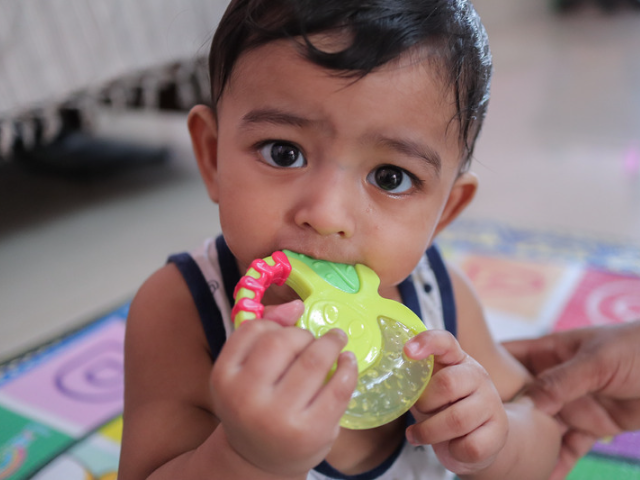Toddler biting may be happening for a number of reasons. This behavior, as irritating, embarrassing, or confusing as it may feel, always communicates some type of need. Before we break down possible reasons children bite, it is necessary to understand that biting is a common behavior for young children.
Toddler Biting as Communication
Children from ages 1-3 may bite as a way to tell us something. They are little humans learning to communicate as they explore the world around them. Toddler biting becomes less frequent in children between the ages of 3 and 4. If your child is over the age of 4 and struggling with biting, it is a good idea to reach out to your pediatrician for help.
Biting can be a difficult behavior to deal with as a caregiver. After all, biting hurts! As an adult, staying calm when your little one bites is your job. If you remain calm, they are much more likely to learn a new way to express themselves with your help.
Biting is a Part of Growing
Children who are growing new teeth often bite because it feels good and soothes the pain they are feeling in their mouths. In fact, the growth of the molars is said to be the most painful stage for a teething child. This growth typically occurs during the ages of 2 and 3.
It’s no wonder biting is such a common occurrence at this age! In this case, you can provide safe items for your child to bite if you believe it may be due to newly growing teeth. A teething necklace or toy could help prevent them from reaching for the nearest arm, especially if it is already available when needed.
Dealing with Toddler Biting
During this phase of life, it can be helpful to stay near your child, especially if they are playing next to other children. For the child who seems to be biting as a way to get your attention, understand that your child wants your attention because humans need a connection to grow and develop.
Start by spending five minutes a day of uninterrupted time with just you and your child. Play together, sing, and laugh. Make meaningful eye contact and help them feel you are fully present with them during this time. Giving your child attention will only fulfill the need they are expressing through biting and could help to eliminate the biting altogether.
Expressing Feelings
Another reason your toddler could be biting is to express a big feeling, such as frustration. Since young children are just beginning to use words to express their wants and needs, they can’t say things like, “I want that toy you are playing with.” So, biting could be a way to get what they are wanting. Or, in a reverse case, another child might take away your child’s toy. So, out of frustration, your child bites the other child rather than saying, “I was playing with that toy, and I wasn’t finished.”
In cases where your child simply doesn’t have the words to say, you can help by sitting near your child as they play. Give your child the words to express their wants when they have difficulty expressing themselves. This might sound like, “When you want the toy, hold out your hand and say ‘toy.’ Then let them practice and set them up for success. Children are learning how and what to say in all of life’s situations by the adults in their lives. After all, you have developed the communication skill, and your child is still working on it.
When to Seek Help
Frequent toddler biting in children older than three may need to be seen by a doctor. If you have tried several of the approaches mentioned and continue to see that your little one is still struggling, or if the biting continues to happen more often and more severely, it might be helpful to schedule a visit with your child’s doctor. This type of toddler biting may indicate that your child struggles to express feelings or self-control. Be prepared to share all of the actions you have been practicing with your child. If you are interested in receiving additional testing for your child, ask about speech-language testing. You also may want to explore the possibility of being referred to a behavior specialist.
Final Thoughts
With your consistent help, your child can learn a new way to express their needs. The days of biting will be long gone. If your toddler bites and you want specific actions you can take to help your child, as well as help from experts, join us at Vitalxchange.




